top of page
The Infatuation, San Francisco
UX/UI Design / Research / Wireframing / Prototyping
The Infatuation, San Francisco
UX/UI Design / Research / Wireframing / Prototyping
Guerilla Advertising
Guerilla Advertising
Saddle Stage Drive-In Concerts
Saddle Stage Drive-In Concerts
Saddle Stage Drive-In Concerts
Saddle Stage Drive-In Concerts
Saddle Stage Drive-In Concerts
Resume
Contact
UInclude
Added feature to support a
more inclusive tool
Role: User Research / Hi & Lo Fidelity / Wireframing / Prototyping
Background
UInclude is an augmented writing tool that focuses on diversifying recruitment materials. UInclude's algorithm detects biased language and informs users when to replace certain words in order to make it more inclusive. Still in the version 1 of their tool, UInlcude has gone through a good amount of beta testing, from those results my team was then able to target some important pain points in the tool.

After assessing beta testing results provided from the UInclude team, we were able to notice some overlapping problems that users were having when using the tool.
Users want to see more explanation behind each biased word so that they can know for next time why not to use such word.
Not only were the current colors used for highlighting often
confusing for users, they also are not accessible for color blind
users.
Users were finding that though the tool was helpful, they did not
produce job descriptions and recruitment materials all too often, they thought this tool would be helpful in other materials that
need editing.
Problem

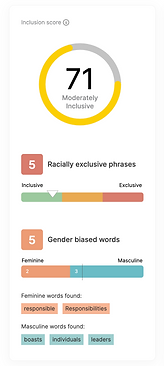
.01 Research

Competitive Analysis
The fist step in our research process was to analyze what other competing websites offered in their tools in order to identify what UInclude could potentially benefit from adding. I examined 5 other websites; Textio, Writer, Datapeople, Develop Diverse, and Gender Decoder, and from there was able to directly compare them to the website and tool of UInlude.
User Interviews
After analyzing beta testing results as well as interview data presnted to us by UInlcude team from previous research, we conducted 9 interviews. Those we interviewed varied from HR, DEI, Recruiters, and simply those who use augmented writing tools.
Affinity Mapping
After conducting 9 user interviews as well as pulling from previous beta testing, we were able to construct an affinity map of all of our findings. From here we were able to identify 5 common occurring ring trends:
-
I need to be educated on WHY certain words are more biased than others
-
I would like to use a tool like UInclude on other materials (Resumes, etc.)
-
The simpler the tool, the better
-
My company has a collaborative process when writing job descriptions; multiple people on different teams touch it before it is finalized.

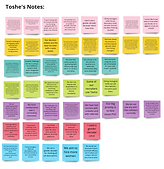


.02 Synthesis
Defining our User
User interviews and affinity mapping then allowed us to begin the process in ideating our primary persona as well as two supporting personas. Analyzing the pain points, needs, and behaviors of both beta testing results as well as interviews lead to the development of our primary persona, Jaime Jones. Because our persona will be a target user of UInclude, we found it important to then construct a user flow as well as a user journey map.
Problem Statement
Jaime needs a space to collaborate on job descriptions with cross functional teams so that they can share markups and edits in real time and track all of the changes made in the editing process.

Describe your image

Describe your image
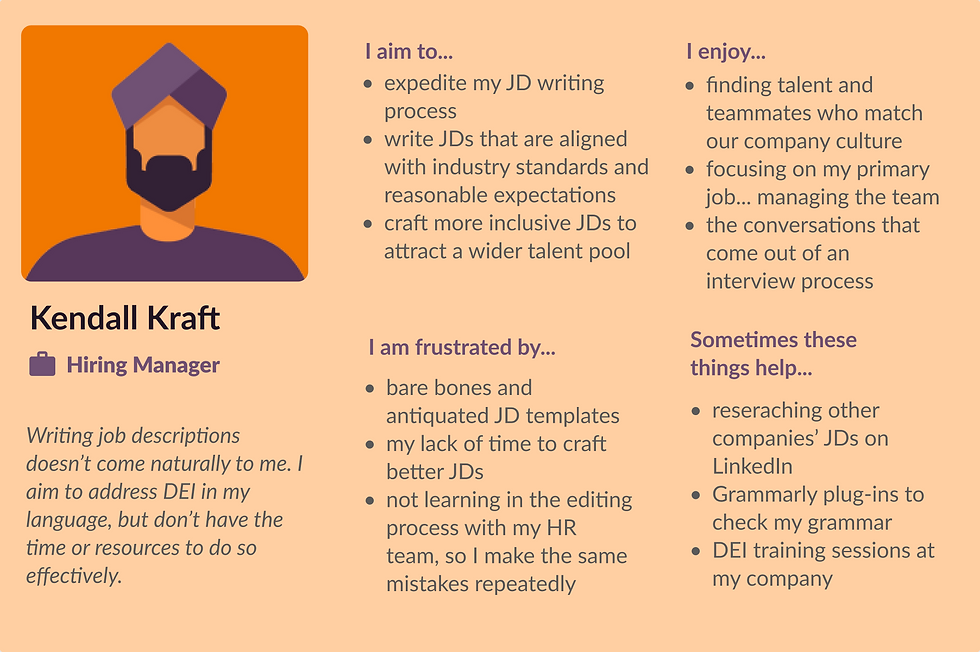

Describe your image
1/3


Journey Map
In order to have a better idea of how or primary persona would not only go about using the tool, but also feel while using the tool, we developed a journey map. This journey map demonstrates how Jaime might emotionally react to each step in the process of using UInlcude when editing and constructing a document.
.03 Ideation






Sketches
After synthesizing our research and better understanding the pain points of the current version of UInlcude, we were then ready to start sketching some ideas for improvements and added assets. We met up with the UInlcude team and held a design studio, where each six of us came up with some quick sketches. After noticing some overlapping ideas and aspects, we were ready for the construction of our low fidelity wireframes.

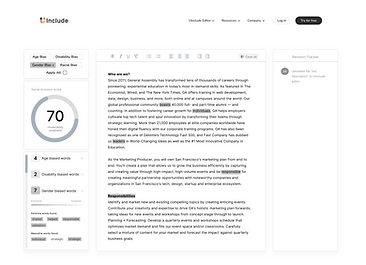




Iteration
After conducting 5 usability tests on our low fidelity prototype, my team was informed of a few areas that were in need of improvements.
The left panel came off as a little overwhelming to the user. The user found this area very heavy in the information. The creation of a dropdown allows to user to simply view their score and overall number of biased words, but also the option to see a dropdown as well if they would like to see the more specific breakdowns.




Users expressed that though they appreciated the idea of the biases having the ability to be added and removed in being seen in the document, it would be beneficial to have an "apply all" option.
Color Modification / Accessibility
In an effort to capture each current and future feature, we propose that one color represents gender-coded words rather than separate colors for masculine and feminine. Formerly, superlatives were purple and words coding for race were represented by a different color, however we propose that all race-coded words also all fall under one color.
We heard from the UInclude team that they may want to add (3) new features. These include coding for ageism, ableism and LGBTQ. In preparation for these added features, we’ve proposed an additional 4 colors to choose from, all of which have been run through contrast checks for color blindness so that they may be accessible.

.04 Delivery



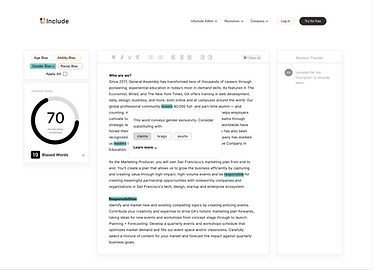


.05 Prototype
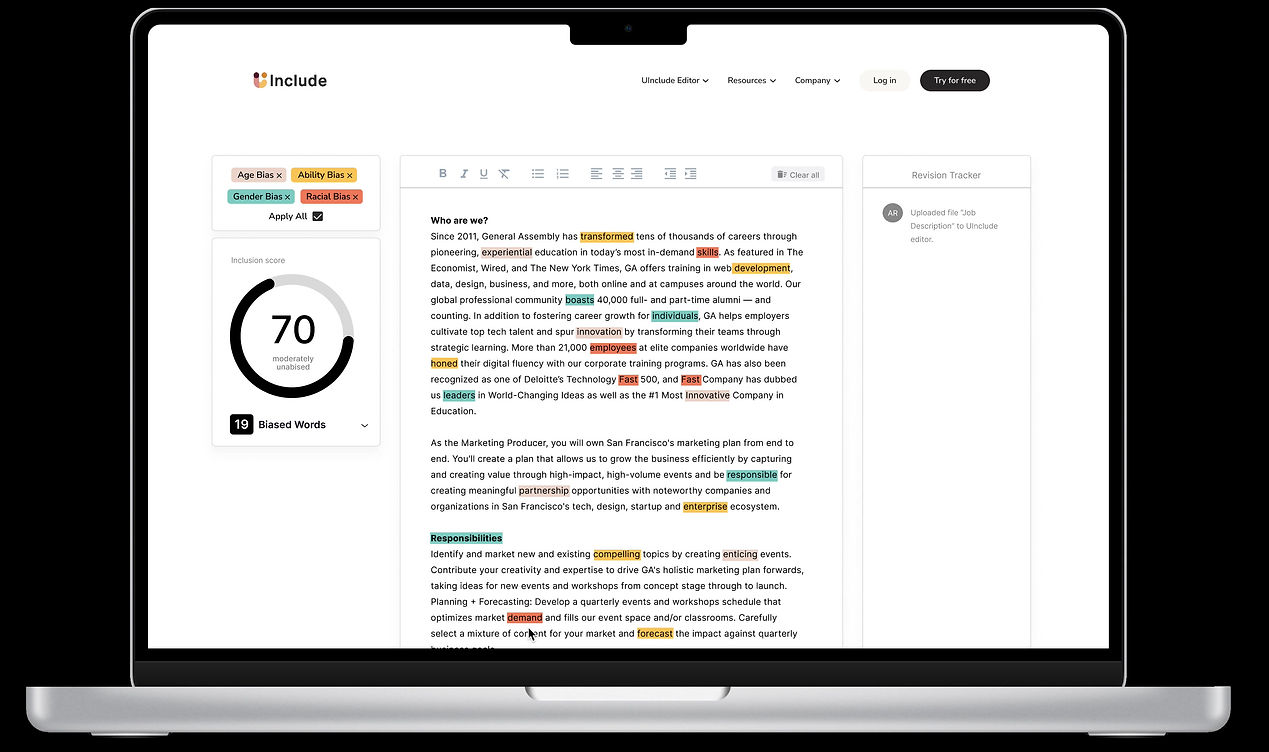
Client Testimonial
"It was an absolute pleasure working with Amy, Annie, and Callie. They're each extremely personable, which made the entire project duration so enjoyable. I really appreciated how communicative they were; every step of the way, my team and I knew exactly what to expect because of their consistent and thorough updates. They also made sure to do their due diligence and understand the space and industry in which we operate very well, instead of assuming expertise. The end result of all of their hard work far exceeded our expectations. Everything they produced was done in such a professional manner. It was clear that they put a lot of thought, research, and time into delivering a prototype that incorporates the feedback and asks we've received from our users. I'm looking forward to working with each of them again in the future!"
- Toshe Ayo-Ariyo, Co-Founder of UInclude
.06 What's next?
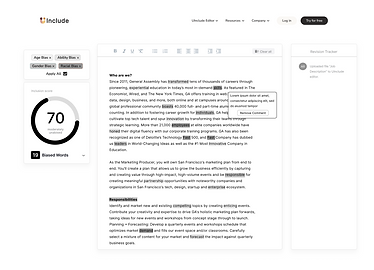





Comment Feature
Because we recieved so much feedback that users would like for the tool to be collaborative, we found that it would be important to add a feature that allows teams to comment on certain words or phrases. The user then has the ability to either leave the comment, resolve and remove the comment, or simply remove the comment.
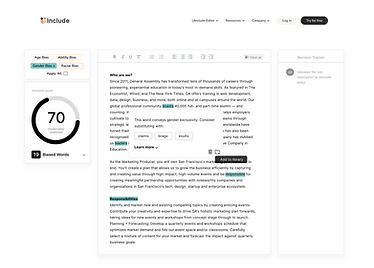


Add / Ignore
Both beta testing as well as our conducted usability testing signified that though users appreciate the suggestions and the flagging of certain words / phrases, it would be beneficial to have an option to ignore or even save for later the suggested word. Users said that some words / phrases, though they might be flagged, have to stay in their posting regardless.

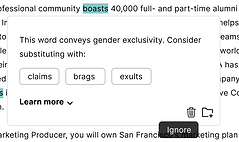
bottom of page